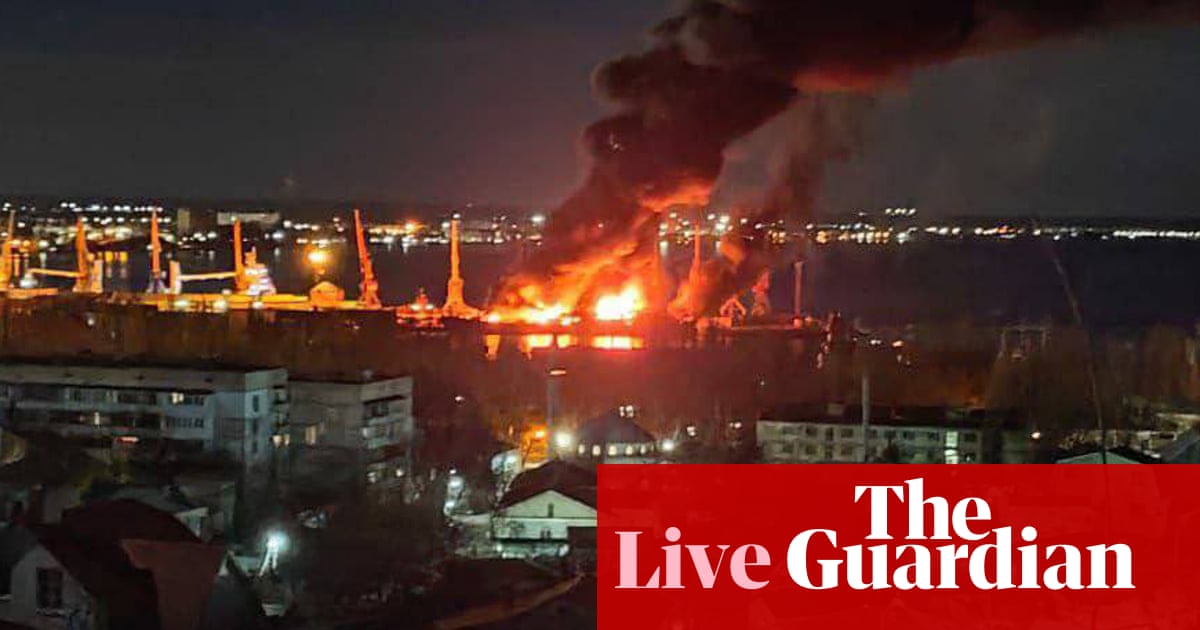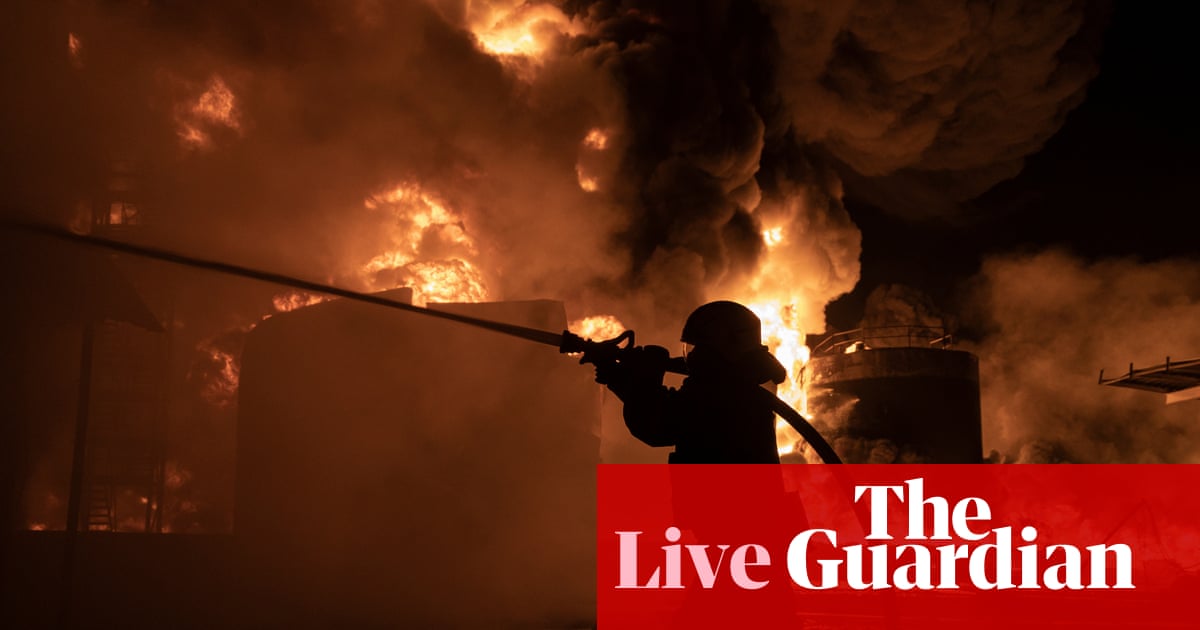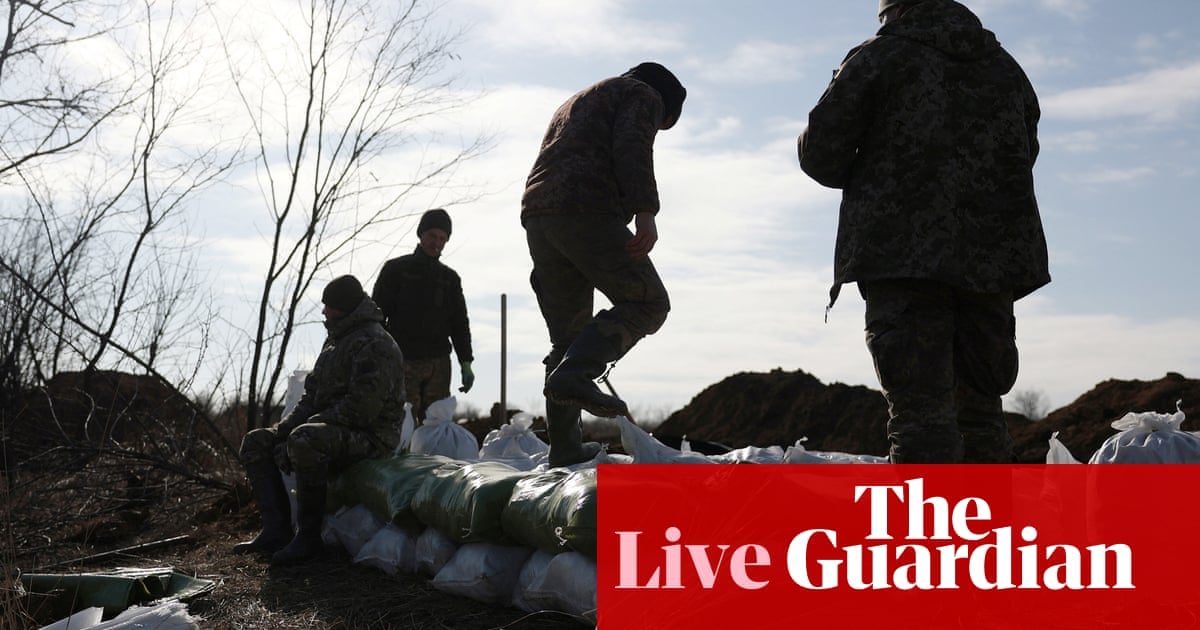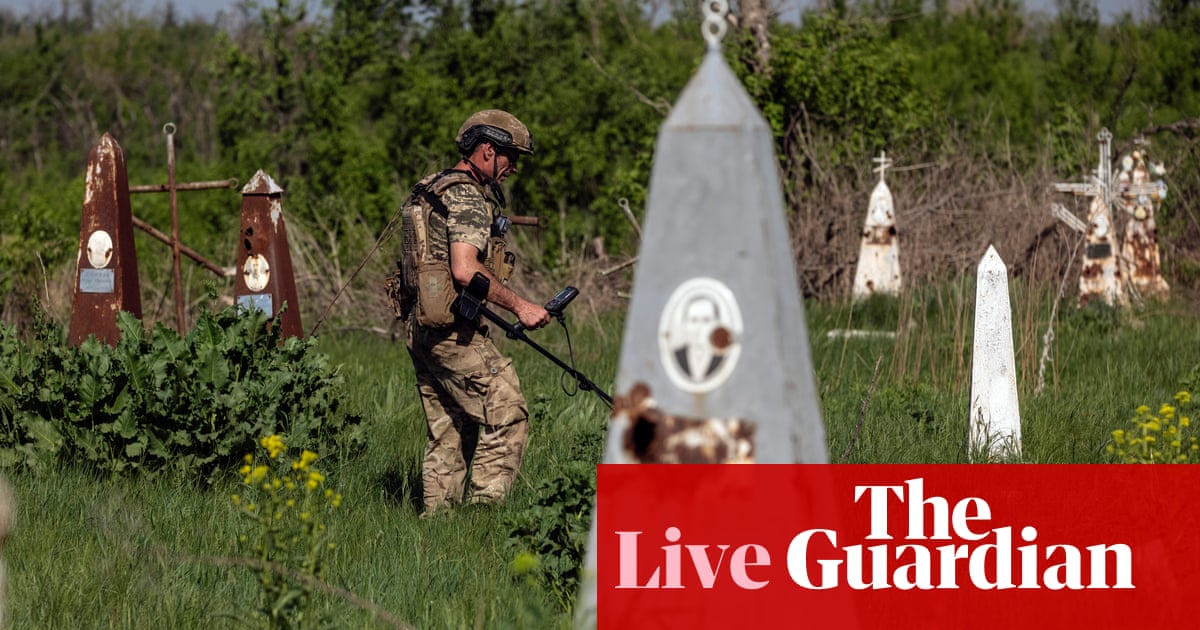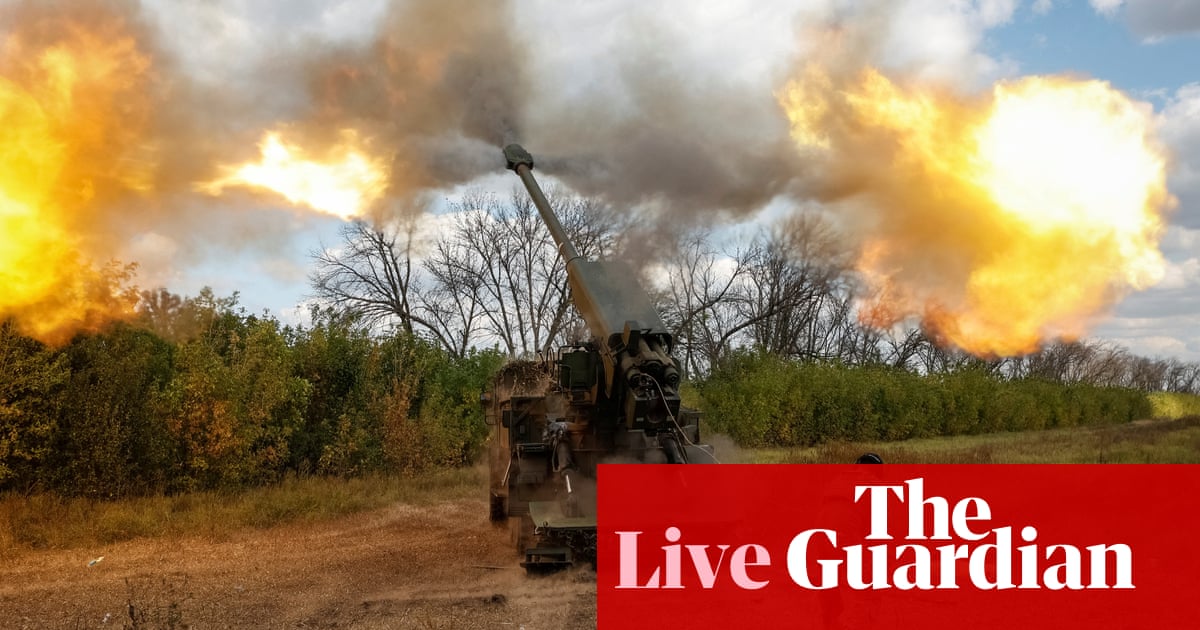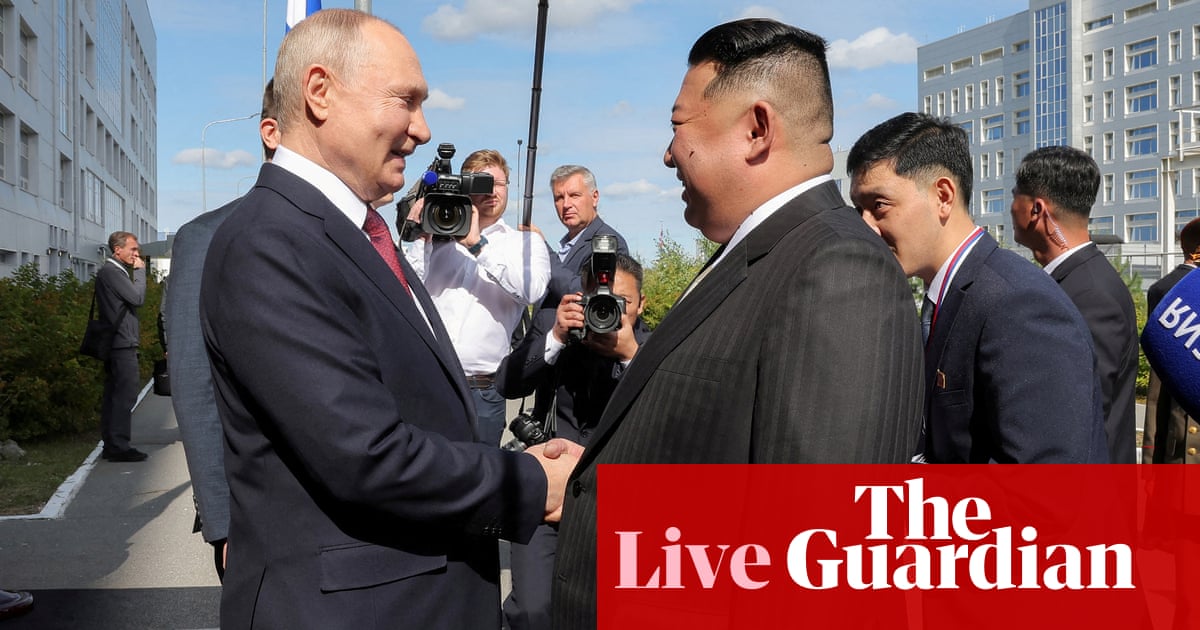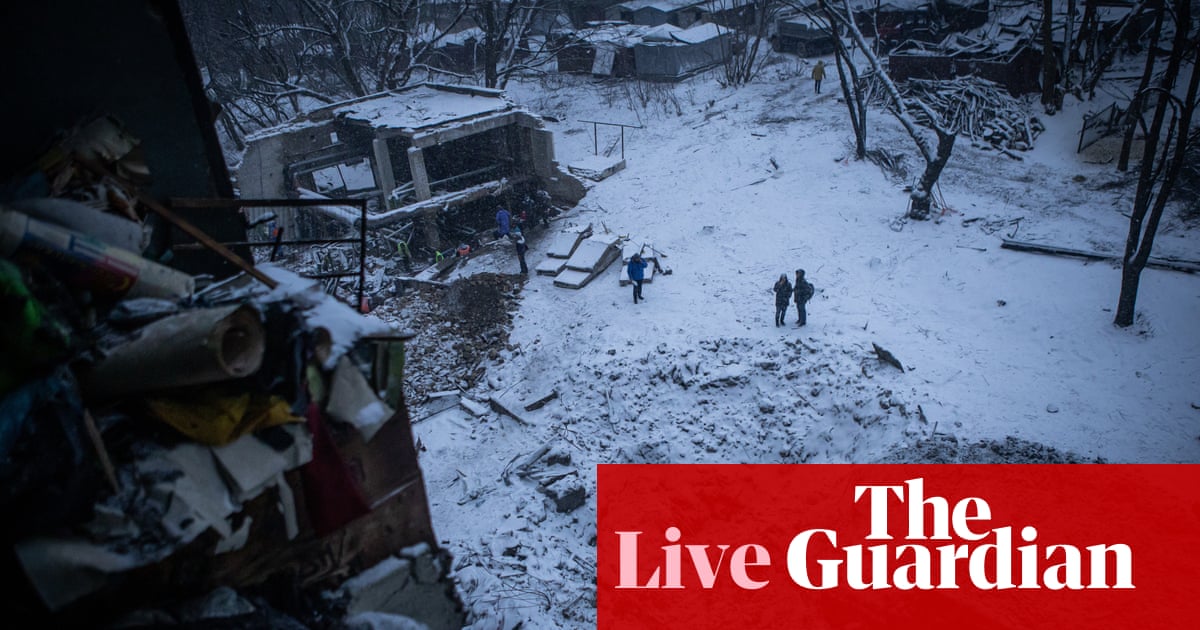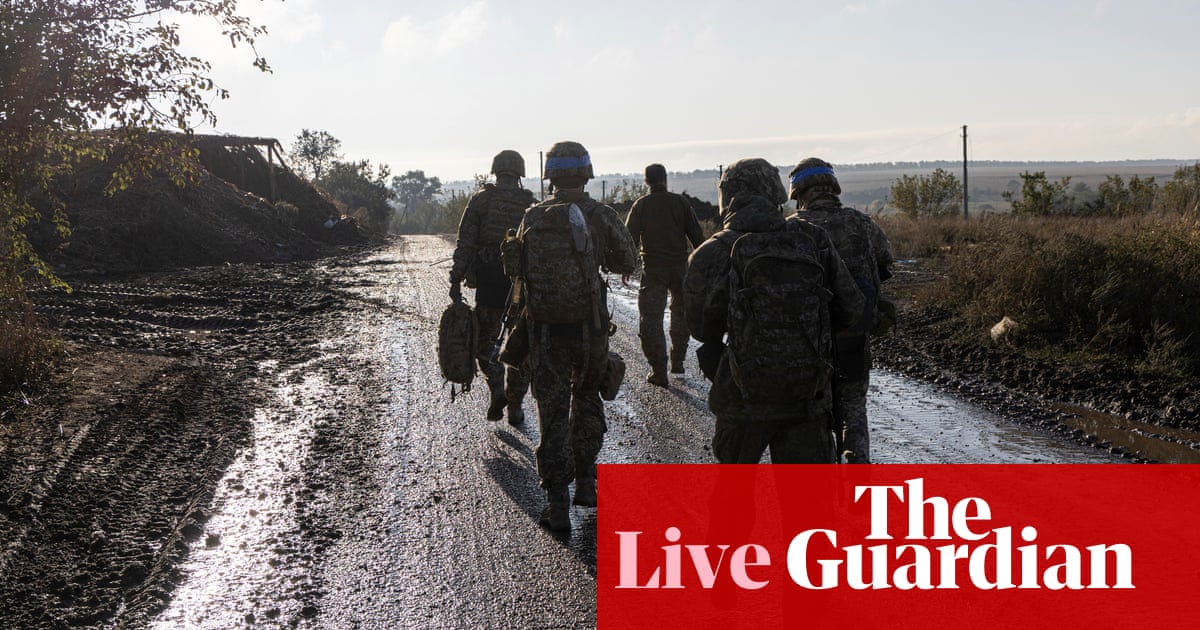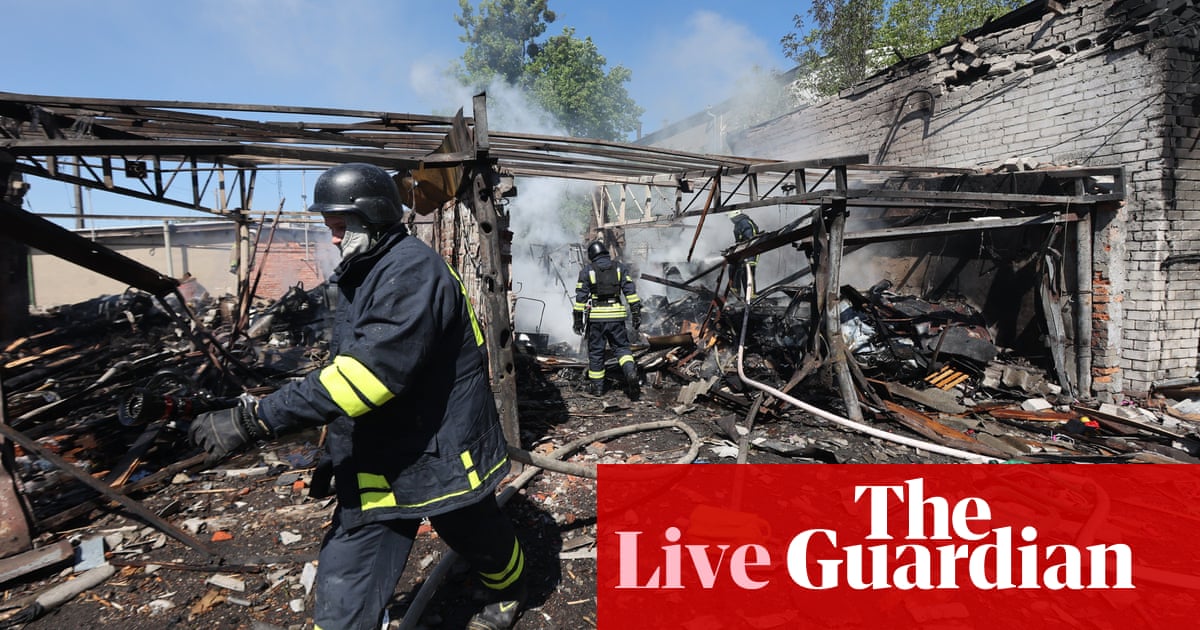
Russia says it hit headquarters of southern grouping of Ukrainian army
The Russian military has attacked the command headquarters of the Ukrainian army’s southern grouping, which is based in the port of Odesa, Russia’s defence ministry has said, according to Reuters.
“The headquarters of the operational command of the southern grouping of the armed forces of Ukraine was struck by operational and tactical aviation, missile forces and artillery,” the ministry said.
It gave no further details about the attack but said that Russian forces were improving their positions along the entire frontline.
Ukrainian prosecutors said residential buildings and civilian infrastructure were damaged in Odesa in an overnight strike while the Southern military command said administrative and residential buildings, medical and educational institutions were hit.
These claims are yet to be independently verified by the Guardian.
Russia, which has made a series of recent tactical gains, is expected to mount a summer offensive and is thought to be in the process of mobilising an extra 100,000 to fight.
Closing summary
We’re ending our live coverage of the Ukraine war for the day. Here is a round-up of the day’s main developments.
The Russian military has attacked the command headquarters of the Ukrainian army’s southern grouping, using missiles and artillery, Russia’s defence ministry said. The claims are yet to be independently verified.
Ukraine’s special services claimed responsibility for a drone attack that hit a Russian oil refinery in Ryazan, south of Moscow, early on Wednesday morning. It said the attack took place about 2:00am (2300 GMT). The governors of the Kursk and Voronezh regions in southwest Russia that border Ukraine also reported drone attacks on their territories, saying there was no damage or injuries.
Russia attacked the Kharkiv region in northeastern Ukraine with guided bombs on Wednesday, killing at least two people and injured two others, the regional governor said. The two people were killed when a car was struck in the village of Zolochiv, where a private home was also struck, governor Oleh Syniehubov wrote on Telegram.
Ukrainian forces defending the strategic eastern stronghold of Chasiv Yar say they are still waiting for fresh ammunition after the US approved a major military aid package. Oleh Shyriaiev, commander of Ukraine’s 225th Separate Assault Battalion that is fighting near the town, said more artillery shells would help his unit hold their positions. “I hope we receive artillery shells soon,” he said. Chasiv Yar is emerging as a key battleground because of its position on elevated ground that could serve as a gateway to the cities of Kostiantynivka, Sloviansk and Kramatorsk.
The US Senate has unanimously approved legislation to ban imports of Russian uranium, after the House of Representatives passed the bill in December. The US president, Joe Biden, is expected now to sign the uranium imports bill into law.
Ukraine’s defence minister, Rustem Umerov, spoke with his Irish and Australian counterparts on Wednesday, thanking them for their continued support.
Umerov said he held an “important call” with the Australian defence minister, Richard Marles.
Commenting on the meeting, Umerov said: “I expressed my gratitude for the recently provided military aid package for Ukraine valued at $100 million. We discussed cooperation in the defense industry, and the possibility of establishing joint ventures with the Australian defense industry.
“Despite the significant distance between our countries, Australian support remains unwavering. Together, we will drive the enemy out of Ukrainian land.”
Later on Wednesday, Umerov said he had a call with the Irish defence minister, Micheal Martin. He said he “thanked him for the constant political and practical support for Ukraine in repelling Russian aggression.”
Umerov said he briefed Martin about the situation on the battlefield. “Ukraine is actively building fortifications. The Ukrainian army needs more weapons and ammunition both to protect the civilian population and to support our operations on the frontlines. Urged my Irish colleague to invest in Ukrainian defence companies,” he said.
Georgian security forces used water cannon, teargas and stun grenades against protesters outside parliament. The sharp escalation happened while lawmakers debated a ‘foreign agents’ bill that is viewed by the opposition and western countries as authoritarian and Russian-inspired.
Reuters said some police officers attacked protesters. Thousands of people have shut down Tbilisi’s central streets nightly since parliament approved the bill’s first reading on 17 April. The bill would require organisations receiving more than 20% of their funding from abroad to register as ‘foreign agents’.
Georgian critics have called the bill ‘the Russian law’, likening it to Moscow’s foreign agent legislation, which has been used to crack down on dissent.
Three more Ukrainian children have been brought home from Russian-occupied territory in Kherson oblast, governor Oleksandr Prokudin wrote on Telegram.
An 11-year-old girl who was left without adult supervision and risked ending up in an “occupation orphanage” was brought back to Ukrainian controlled territory, along with a 9-year-old boy and 13-year-old-boy, he said.
The boys were being cared for by an adult brother who risked joining the Russian army, according to Prokudin, who said 66 children from the Kherson region have been returned to territory controlled by Ukraine since the start of the year.
The girl was rescued thanks to the cooperation of the Save Ukraine organisation, guardianship authorities and the children’s services. The boys were rescued thanks to the ministry of reintegration of the temporarily occupied territories of Ukraine, the public union Ukrainian network for the rights of the child, guardianship and care authorities and children’s services of the children’s region, Prokudin added.
At least 19,546 children have been deported or forcibly displaced since the start of Russia’s full-scale invasion of Ukraine in February 2022, and 388 have been returned home, according to the Children of War database.
Summary of the day so far...
The Russian military has attacked the command headquarters of the Ukrainian army’s southern grouping, using missiles and artillery, Russia’s defence ministry said. The claims are yet to be independently verified.
Ukraine’s special services claimed responsibility for a drone attack that hit a Russian oil refinery in Ryazan, south of Moscow, early on Wednesday morning. It said the attack took place about 2:00am (2300 GMT). The governors of the Kursk and Voronezh regions in southwest Russia that border Ukraine also reported drone attacks on their territories, saying there was no damage or injuries.
Russia attacked the Kharkiv region in northeastern Ukraine with guided bombs on Wednesday, killing at least two people and injured two others, the regional governor said. The two people were killed when a car was struck in the village of Zolochiv, where a private home was also struck, governor Oleh Syniehubov wrote on Telegram.
Ukrainian forces defending the strategic eastern stronghold of Chasiv Yar say they are still waiting for fresh ammunition after the US approved a major military aid package. Oleh Shyriaiev, commander of Ukraine’s 225th Separate Assault Battalion that is fighting near the town, said more artillery shells would help his unit hold their positions. “I hope we receive artillery shells soon,” he said. Chasiv Yar is emerging as a key battleground because of its position on elevated ground that could serve as a gateway to the cities of Kostiantynivka, Sloviansk and Kramatorsk.
The US Senate has unanimously approved legislation to ban imports of Russian uranium, after the House of Representatives passed the bill in December. The US president, Joe Biden, is expected now to sign the uranium imports bill into law.
We reported earlier (see post at 09.23) how Ukrainian forces defending the strategic eastern stronghold of Chasiv Yar say they are still waiting for fresh ammunition as they try to repel intensifying attacks.
Russian forces are assaulting the town using airdropped glide bombs to pound Ukrainian positions.
Here are some images of Chasiv Yar, which is emerging as a key battleground because of its position on elevated ground that could serve as a gateway to the cities of Kostiantynivka, Sloviansk and Kramatorsk.
Russia says it hit headquarters of southern grouping of Ukrainian army
The Russian military has attacked the command headquarters of the Ukrainian army’s southern grouping, which is based in the port of Odesa, Russia’s defence ministry has said, according to Reuters.
“The headquarters of the operational command of the southern grouping of the armed forces of Ukraine was struck by operational and tactical aviation, missile forces and artillery,” the ministry said.
It gave no further details about the attack but said that Russian forces were improving their positions along the entire frontline.
Ukrainian prosecutors said residential buildings and civilian infrastructure were damaged in Odesa in an overnight strike while the Southern military command said administrative and residential buildings, medical and educational institutions were hit.
These claims are yet to be independently verified by the Guardian.
Russia, which has made a series of recent tactical gains, is expected to mount a summer offensive and is thought to be in the process of mobilising an extra 100,000 to fight.
Ukraine"s special services behind drone attack on Russian oil refinery
Ukraine’s special services has claimed responsibility for a drone attack on a Russian oil refinery in Ryazan, south of Moscow (see the opening summary at 08.30 for more details).
“As a result of an operation by the Defence Intelligence of Ukraine on the night of 1 May, a UAV (drone) was used to hit the Ryazan oil refinery in Russia,” Ukraine’s special services said in a statement to AFP.
It said the attack took place about 2:00am (2300 GMT).
Ryazan regional governor, Pavel Malkov, confirmed an attack but gave no details. “The Ryazan region was targeted by a drone attack. According to preliminary information there are no casualties,” he said in a Telegram post earlier.
The Security Service of Ukraine (SBU) is carrying out planned counter-intelligence exercises in Kyiv, the SBU press service reported.
The SBU said the main purpose of the measures is to check and strengthen “counter-sabotage protection” of important state facilities and places where large numbers of people gather.
Law enforcement officers are looking to identify prohibited items in buildings – such as offices and public service institutions – and carry out checks on some citizens who are in the territory of the central part of the city.
“The Security Service conducts planned counter-intelligence (security) measures on the territory of the Shevchenkiv district of Kyiv. Among the main locations are Sofiyska and Mykhailivska squares and the surrounding area,” the SBU said.
“During their implementation, it is possible to restrict passage and drive through the city streets, check citizens’ documents and inspect motor vehicles.”
Russian guided bombs kill two in Kharkiv region, governor says
Russia attacked the Kharkiv region in northeastern Ukraine with guided bombs on Wednesday, killing at least two people and injured two others, the regional governor said.
The two people were killed when a car was struck in the village of Zolochiv, where a private home was also struck, governor Oleh Syniehubov wrote on Telegram.
Ten private residences were also damaged but no casualties were reported in a Russian attack on the city of Kharkiv, the city’s mayor, Ihor Terekhov, said.
The attack on Zolochiv – about 15 kilometres (nine miles) from the Russian border – also caused three fires, injuring two people in their seventies, Synegubov said.
The Kharkiv region has come under intense fire this spring as Russian forces attacked civilian and energy infrastructure, and Ukraine says its air defences are increasingly stretched as it desperately waits for more weapons and supplies from allies.
In its attacks in recent weeks, Moscow has begun using new powerful guided aerial bombs to devastating effect.
Ukrainian forces near vital stronghold of Chasiv Yar say they badly need ammunition from allies
Ukrainian forces defending the strategic eastern stronghold of Chasiv Yar say they are still waiting for fresh ammunition after the US approved a major military aid package, Reuters reported.
Moscow’s army is advancing west of Avdiivka, a city it captured in February, and its troops have reached the outskirts of Chasiv Yar, another major objective that would allow them to command higher ground and target towns and cities further to the west.
Oleh Shyriaiev, commander of Ukraine’s 225th Separate Assault Battalion that is fighting near the town, said more artillery shells would help his unit hold their positions.
“I hope we receive artillery shells soon,” he said, adding that munitions supplied by allies had made a significant difference on the battlefield in the past.
“I witnessed events a year ago when Wagner was advancing,” Shyriaiev said, referring to the Russian mercenary group that staged a failed mutiny on Moscow last year.
“We received cluster munitions which changed the situation significantly and we managed to successfully counterattack.”
Cluster munitions are banned by many countries but have been used by both sides in the Ukraine conflict.
More trained troops and long-range weapons would also help Ukraine defend its territory more effectively, Shyriaiev said.
“If we get long-range weapons, our leaders will cut (Russian forces) off from logistics and supplies.”
Ukraine has already received some long-range missiles from its allies, which have been used against Russian airfields, ammunition depots, command posts and troop concentrations.
The US aid package includes $23.2bn to replenish US weapons, stocks and facilities and $11.3bn for current US military operations in the region. The US does not have troops in Ukraine, but the Pentagon has been training Ukrainian troops elsewhere in the region.
These images reveal the aftermath of Russian strikes on Kharkiv yesterday, which, according to the regional governor, killed at least one person and injured nine others.
Security officials believe the Kremlin’s original war aims are unchanged, more than two years after Vladimir Putin’s full-scale invasion. They include seizing the cities of Kyiv, Kharkiv and Odesa and occupying Ukraine’s southern Black Sea coast.
They assess that Russia will not be able to storm Kharkiv, a city of more than 1 million people close to the Russian border but will continue to bomb and to threaten it.
US Senate approves ban on Russian uranium imports
The US Senate has unanimously approved legislation to ban imports of Russian uranium, after the House of Representatives passed the bill in December.
Uranium is used to power commercial nuclear reactors that produce electricity.
The US president, Joe Biden, who last week signed a foreign aid bill to provide billions of dollars of aid to Ukraine, is expected now to sign the uranium imports bill into law.
American nuclear power plants imported about 12% of their uranium from Russia in 2022, according to the US Energy Information Administration.
A spokesperson for the national security council had said that Congress imposing the ban “would provide assurance to industry, allies, and partners that the US has made a clear decision to establish a secure nuclear fuel supply chain, independent of adversarial influence, for decades to come”.
Russia"s defence minister orders more weapons for war in Ukraine
Good morning and welcome to our Ukraine blog.
Reuters is reporting that the Russian defence minister, Sergei Shoigu, has ordered more, and swifter, delivery of weapons for Moscow’s war in Ukraine.
At a meeting with the top military command for Moscow’s fight in Ukraine, the chief of the general staff, Valery Gerasimov, who is in charge of the operation, delivered a report to Shoigu, the Russian defence ministry wrote on Telegram.
“To maintain the required pace of the offensive … it is necessary to increase the volume and quality of weapons and military equipment supplied to the troops, primarily weapons,” it cited Shoigu as saying in a statement posted on Telegram.
With Kyiv blaming lack of weapons, Russian forces have made nearly daily tactical advances in recent weeks along the frontline in Ukraine’s southeast. Russia has taken about half a dozen villages in the Donetsk region, while firming up battlefield positions in the Kharkiv region.
In other news:
Ukraine launched drones on several Russian regions in hours leading to Wednesday morning, Russian officials said, with unofficial Russian news outlets reporting a fire at the Ryazan oil refinery after the attack. Pavel Malkov, governor or the Ryazan region, which shares a border with the Moscow region in its northwestern parts, said that there were no injuries in the drone attacks there.
Russian Telegram channel Baza, which is close to the security services, reported that the attack sparked a fire at the Ryazan oil refinery. The governors of the Kursk and Voronezh regions in southwest Russia that border Ukraine also reported drone attacks on their territories, saying there was no damage or injuries.
Russian strikes on Kharkiv, in north-east Ukraine, killed at least one person and injured nine others on Tuesday, the regional governor said. Ukraine’s railway company said the 24-year-old victim was one of its employees.
A 98-year-old woman in Ukraine has escaped Russian-occupied territory by walking almost 10km (six miles) alone, wearing a pair of slippers and supported by a cane. Lidia Stepanivna Lomikovska became separated from her family and continued alone after they decided to leave the frontline town of Ocheretyne.
Russian-occupied Crimea has come under Ukrainian attack, the Moscow-installed authorities said, from what they described as US-supplied Atacms missiles.
Ukrainian president Volodymyr Zelenskiy said his country needed “a significant acceleration” in deliveries of weaponry. “We are very much counting on prompt deliveries from the United States,” he said. “These supplies must make themselves felt in disrupting the logistics of the occupiers, in making them afraid to base themselves anywhere on occupied territory and in our strength.”
The International Rescue Committee described a worsening situation in Kharkiv, which lies near the Russian border and is Ukraine’s second-largest city, with an increasingly anxious population. The IRC said recent attacks had caused “extensive damage to civilian infrastructure and led to a sharp increase in casualties among the local population … air raid sirens sound day and night”, with people “experiencing heightened anxiety and distress”.





